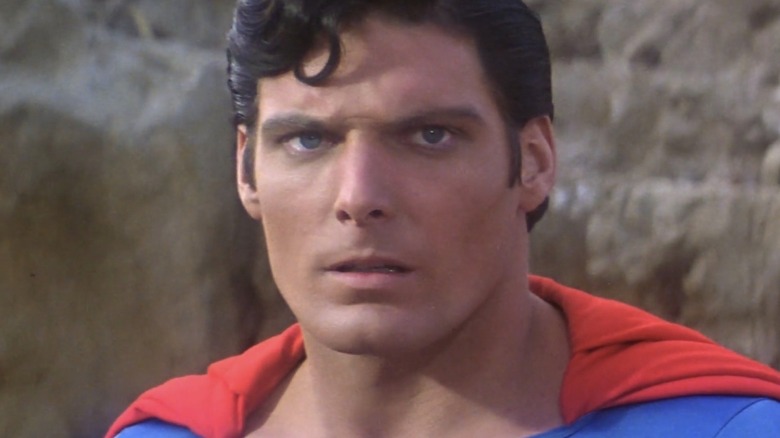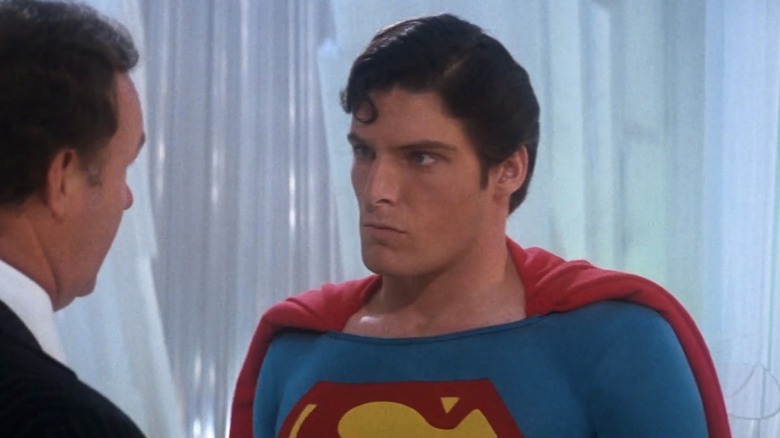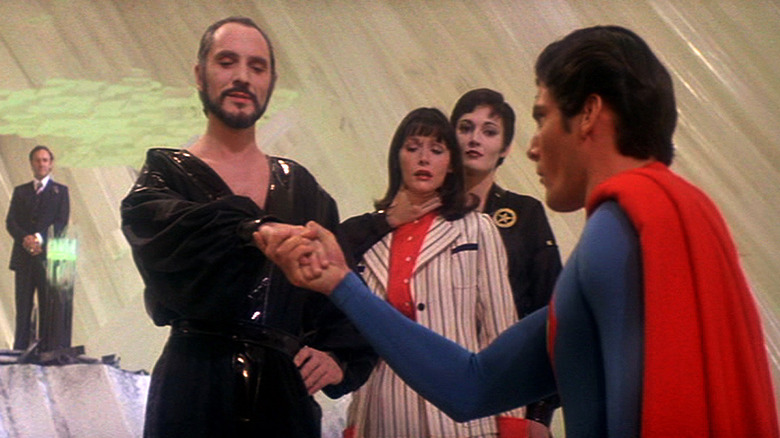Writer Tom Mankiewicz's Unusual Credit On Richard Donner's Superman Movies Landed Him In Trouble
When we talk about movies, screenwriters don't get enough credit. Their names are often overlooked while directors are treated as the true auteurs. Maybe part of that stems from the system of Hollywood itself, which tends to leave screenwriters low on the totem pole, with "Mank" even likening Herman J. Mankiewicz — the co-writer of "Citizen Kane" — to a mere "organ grinder's monkey."
Superhero films and other big studio tentpoles with a lot riding on their success can sometimes involve a revolving door of screenwriters, and this has been the case for decades. "Superman: The Movie" had four credited writers, three of whom carried over to the sequel, "Superman II." But one name you won't see credited as a screenwriter in either movie, despite his important writing contributions, is that of Mank's nephew, Tom Mankiewicz.
There's a rather complicated reason for that. For both "Superman" and "Superman II," Tom Mankiewicz did receive a credit as "creative consultant," a new title without much precedent behind it in movie history. Rather than downplay his role in the film's production, this was meant to show that Mankiewicz had gone above and beyond the call of screenwriting duty.
In a 2006 interview with Dharmesh Chauhan (via the Superman CINEMA archives on Caped Wonder), Mankiewicz explained that he had worked closely with director Richard Donner on other aspects of the "Superman" production. "From the moment I came on the film," Mankiewicz said, "we did a lot of the casting together, we looked at every test together, we picked locations together and I was on that film for well over a year."
It was the order in which Mankiewicz's name was placed in the credits that created a problem. "I had no idea my name was coming after the writers, which is a total no-no," he said.
The Tom Mankiewicz rule
As Mankiewicz explained, "The WGA [Writer's Guild of America], DGA [Director's Guild of America], and everyone else, they say, 'writer, producer, and director.' You don't put a writer with another title after the writers, it's just not done."
According to Mankiewicz, the reason he did so much extra work for "Superman" is that the film's producers, Ilya and Alexander Salkind, didn't have much practical filmmaking experience. The Salkinds infamously fired Donner three-fourths of the way through "Superman II," which was shot mostly back-to-back and had originally been part of the same 400-page script as "Superman."
Mankiewicz, meanwhile, had his own problems with the WGA because of where his name was placed in the "Superman" credits. In the same interview, he revealed:
"The Writers Guild sued me, in the sense that they called me to a hearing with the head of the guild and everyone else, including Warner Bros.' legal department. I showed them thirteen round trips to London after I finished writing ['Superman'] — then it was the editing, the scoring, and I said that it really reflects what I did and I'm so sorry about the placement of it because I didn't know that was where they were gonna put it there and they said, 'Fine, but in 'Superman II' we'd like to correct it, it should come before the writers,' which is what happened. That's how that credit came and [was] subsequently outlawed by the Writer's Guild. It's called the 'Tom Mankiewicz rule.' Informally, there's no such thing as a separate title called 'creative consultant' anymore."
The average moviegoer might not register that Mankiewicz's name comes after the writers in "Superman," but before them in "Superman II," yet it was instrumental in determining how future screenwriters would be credited onscreen. The "Superman" credits saga didn't end there, though.
Donner's revenge
In his autobiography "My Life as a Mankiewicz: An Insider's Journey Through Hollywood," co-written with Robert David Crane, Mankiewicz shed more light on exactly why the Writers Guild of America got so hot under the collar about his credit and its placement. Recalling that the WGA "went berserk over the placement," Mankiewicz explains that "the Writers Guild claims to own the rights to the word 'creative' on the screen." Therefore, Donner not only using the "creative consultant" credit without the guild's approval, but using it to disrupt the very core of the established credits order, had a lot of monocles popping out.
Mankiewicz disagreed with the WGA's self-proclaimed ownership over the word "creative" ("I've always said, 'Jesus, a lot of great cinematographers and designers and so on might disagree with you that 'creative' only applies to writing'"), but it was director Richard Donner who, decades later, chose to defy the WGA's mandate over the order of credits in "Superman II." After everything that Mankiewicz had contributed above and beyond the role of scriptwriter, it seems that the "creative consultant" credit was important to Donner.
Important enough that, when he released his director's cut of the movie in 2006, Donner made one small adjustment that probably passed most audience members by. But after the hours of legal back-and-forth he'd been through with the WGA, Mankiewicz couldn't miss it.
When "Superman II: The Richard Donner Cut" was premiered at the Directors Guild, I was sitting with Margot [Kidder] right behind Dick in the audience, and here it comes, "Written by Bob Benton and Newman and Mrs. Newman," and son of a b****, I'm after the writers again. Dick stuck me after the writers. I said, "Oh, my God." And I heard from in front of me, "Just shut the f*** up."


